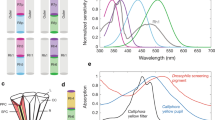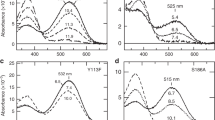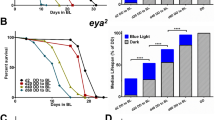Abstract
VITAMIN A deprivation causes a profound reduction in visual sensitivity and photopigment concentration in the eyes of both vertebrates and invertebrates1,2. In vertebrates vitamin A deprivation results in degeneration of photoreceptor cells3 and decreases the number of intramembrane particles visualised in the disks of rod outer segments by freeze-fracture electron microscopy4. This and other evidence5 suggests that these particles represent rhodopsin molecules. Invertebrate photoreceptors have similar, 8-nm intramembrane particles in the stacked microvilli which form their light-sensitive rhabdomeres6,7. The number of particles is comparable to the number of pigment molecules present8 and is dependent on the state of light adaptation9. We describe here a study of the effects of vitamin A deprivation on the fine structure, photopigment content, and sensitivity of Drosophila photoreceptors. The results support the hypothesis that most of the intramembrane particles in invertebrate rhabdomeres, like those in vertebrate photoreceptors, are rhodopsin molecules.
This is a preview of subscription content, access via your institution
Access options
Subscribe to this journal
Receive 51 print issues and online access
$199.00 per year
only $3.90 per issue
Buy this article
- Purchase on Springer Link
- Instant access to full article PDF
Prices may be subject to local taxes which are calculated during checkout
Similar content being viewed by others
References
Dowling, J. E. & Wald, G. Proc. natn. Acad. Sci. U.S.A. 44, 648–661 (1958).
Goldsmith, T. H., Barker, R. J. & Cohen, C. F. Science 146, 65–67 (1964).
Dowling, J. E. & Wald, G. Proc. natn. Acad. Sci. U.S.A. 46, 587–608 (1960).
Jan, L. Y. & Revel, J.-P. J. Cell Biol. 62, 257–273 (1974).
Hong, K. & Hubbell, W. L. Proc. natn. Acad. Sci. U.S.A. 69, 2617–2621 (1972).
Eakin, R. M. & Brandenburger, J. L. Am. Zool. 15, 851–863 (1975).
Eguchi, E. & Waterman, T. H. Cell Tiss. Res. 169, 419–434 (1976).
Fernandez, H. R. & Nickel, E. E. J. Cell Biol. 69, 721–732 (1976).
Brandenburger, J. L., Reed, C. T. & Eakin, R. M. Am. Zool. 15, 782 (1975).
Sang, J. H. J. exp. Biol. 33, 45–72 (1956).
Karnovsky, M. J. J. Cell Biol. 27, 137A–138A (1965).
Harris, W. A., Stark, W. S. & Walker, J. A. J. Physiol. 256, 415–439 (1976).
Brammer, J. D. & White, R. H. Science 163, 821–823 (1969).
Carlson, S. D., Gemne, G. & Robbins, W. E. Experientia 25, 175–177 (1969).
Paulsen, R. & Schwemer, J. Biochim. biophys. Acta 283, 520–529 (1972).
Author information
Authors and Affiliations
Rights and permissions
About this article
Cite this article
HARRIS, W., READY, D., LIPSON, E. et al. Vitamin A deprivation and Drosophila photopigments. Nature 266, 648–650 (1977). https://doi.org/10.1038/266648a0
Received:
Accepted:
Issue Date:
DOI: https://doi.org/10.1038/266648a0
This article is cited by
-
Phototransduction and retinal degeneration in Drosophila
Pflügers Archiv - European Journal of Physiology (2007)
-
Carotenoid replacement inDrosophila: freeze-fracture electron microscopy
Journal of Neurocytology (1996)
-
Fatty acids in the lipids ofDrosophila heads: Effects of visual mutants, carotenoid deprivation and dietary fatty acids
Lipids (1993)
-
Phospholipids inDrosophila heads: Effects of visual mutants and phototransduction manipulations
Lipids (1993)
-
Rhabdomeric membrane and smooth endoplasmic reticulum in photoreceptors of Manduca sexta: modulations associated with the diurnal light/dark cycle and effects of chromophore deprivation
Cell & Tissue Research (1992)
Comments
By submitting a comment you agree to abide by our Terms and Community Guidelines. If you find something abusive or that does not comply with our terms or guidelines please flag it as inappropriate.



